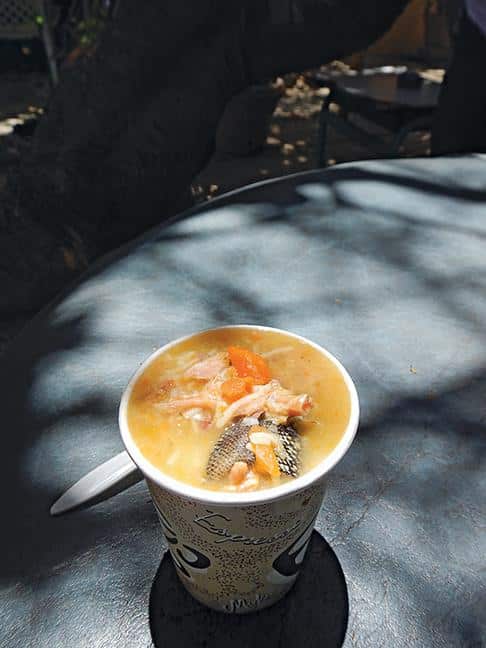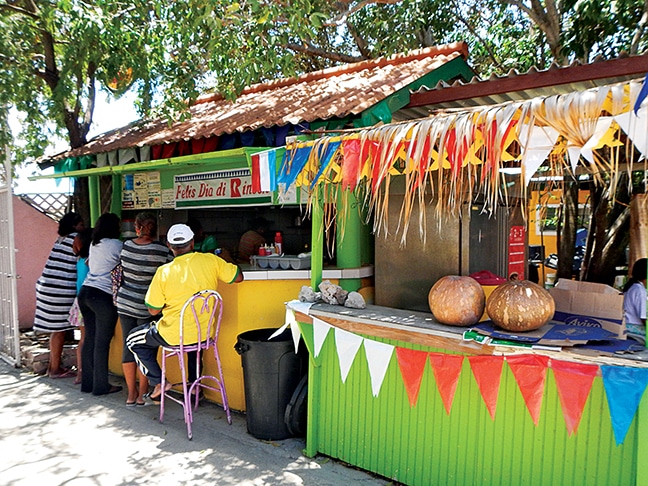Caribbean Food: Would You Try Bonaire's Iguana Soup?
They're sold out ... again. Less than an hour after opening for lunch, on a breezeless Bonaire schorcher, the Rose Inn's most famous soup, made from the island's most famous lizard, has vanished. A dozen locals sit nearby. Sweat drips from their brows. The soup I seek simmers before them. Hot soup on a hot day. None left for me. Wait. What did the cook just ask me? Would I like a small cup of leftover soup scooped from the bottom of the pot? Um ...
"Trust me." For days, my local friend Andreina has insisted the Rose Inn's iguana soup is a must for travelers. Now, a woman behind the counter tilts a cauldron of its remnants our way. Leftover broth dribbles to one side over vegetables and (yikes) scales.
"Come, she'll bring it out to us."
Andreina leads me to more leftovers: sun-bleached plastic chairs set under a tattered tarp. In its shade, the cup of soup being handed to me looks delicious. Scale-free. Yum.
"You just sipped the broth." Andreina is on to me. The broth is easy. Onions, carrots, noodles — home-cooked, tastes like chicken soup. Good soup. But I'm sweating in the heat. Hot soup sold out today? I don't get it.
"Iguanas have two penises."
"Excuse me?"
Andreina blushes. "The soup is believed to offer many health benefits, especially in the bedroom."
"Because iguanas have two penises?"
She nods, leading my eyes to a table of older local men and empty soup bowls.
This isn't the first time I've heard such claims. There have been miracle plants on hikes, conch off a shoreline, rum in a punch. Am I ever more than a stroll, dive or drink away from an aphrodisiac in the Caribbean? And this two-penis logic: Does it apply to all animals with multiple appendages? Should soccer goalies eat more octopus?
"There's more to it." Andreina tells me Bonairians have eaten iguana "from the beginning." That the island imports most all of its food. Iguanas are one of only a few local staples. A cheap staple.
"Food born of necessity?" I ask.
"Sometimes. But try the meat," she demands. "Then decide."

I let some fleshy bits find their way onto my spoon. They taste like ... bones. And more bones. Every bite bony bits. Tooth care starts to trump taste.
"Good, yes? Tastes like chicken?"
"Umm ... sure," though I'm not.
"I'm just sad that it's not the time of year for you to try their eggs," she says.
"Eggs?"
"They're a delicacy."
"And the iguana's population ... ?"
"Actually, that's becoming a problem." Andreina mentions an iguana preservation society, and how the island's property developments (not soup lovers) threaten the species most.
"There's talk of iguana-crossing signs being posted on roads."
It's a fun sign to imagine. But I'm rather surprised hunting iguanas for food is still legal. I've heard it isn't on Aruba. Meanwhile, Bonaire's reefs win global awards for sustainability. There's a 400-strong donkey preserve nearby. Yet iguanas ...
"Tradition," Andreina asserts.
It's a tough tradition to swallow. Maybe it's my leftovers, but bones haunt every bite. The scales prove tougher (not like chicken skin), and mess with my mind. I'm flashing on Iggy, my brother's childhood pet iguana. My brother shared all things iguana: They have a third eye on top of their heads; they can fall 50 feet from a tree without injury; males defend females when threatened; they can swim underwater. ...
"What do you think?" asks Andreina. I thank her. Talk turns to tomorrow, and soup seconds. I ponder the thought. Like many iguanas on Bonaire, I'm on the fence.
Ready to make the trip and try it yourself? See Our No. 1 Resort on Bonaire.
